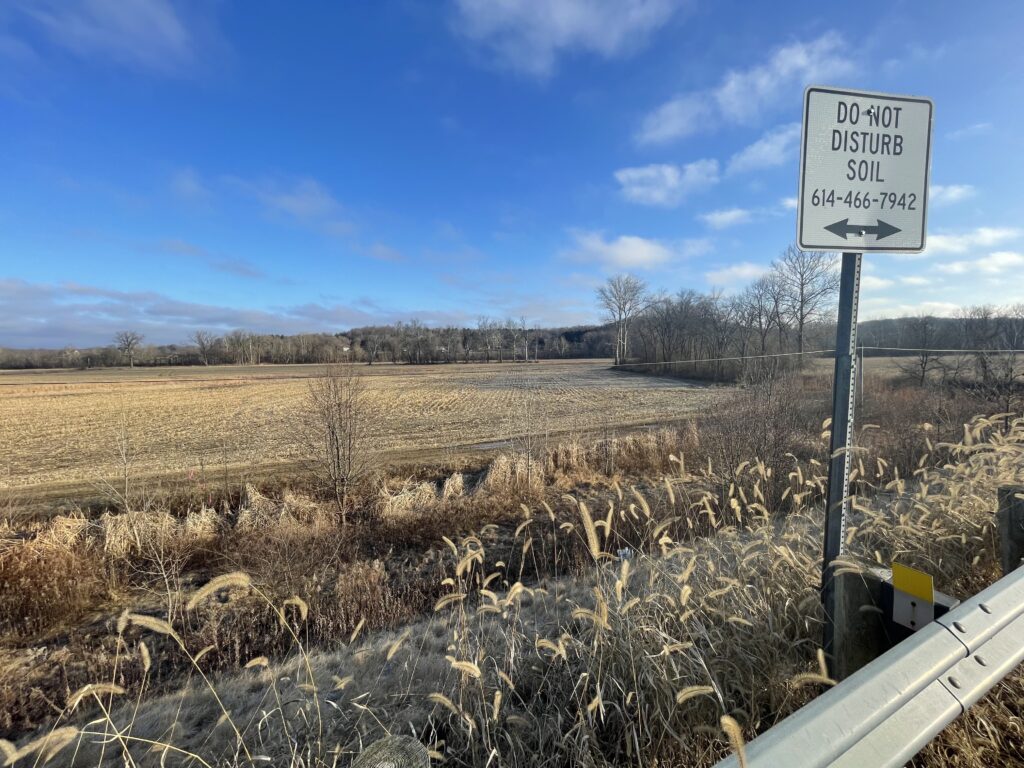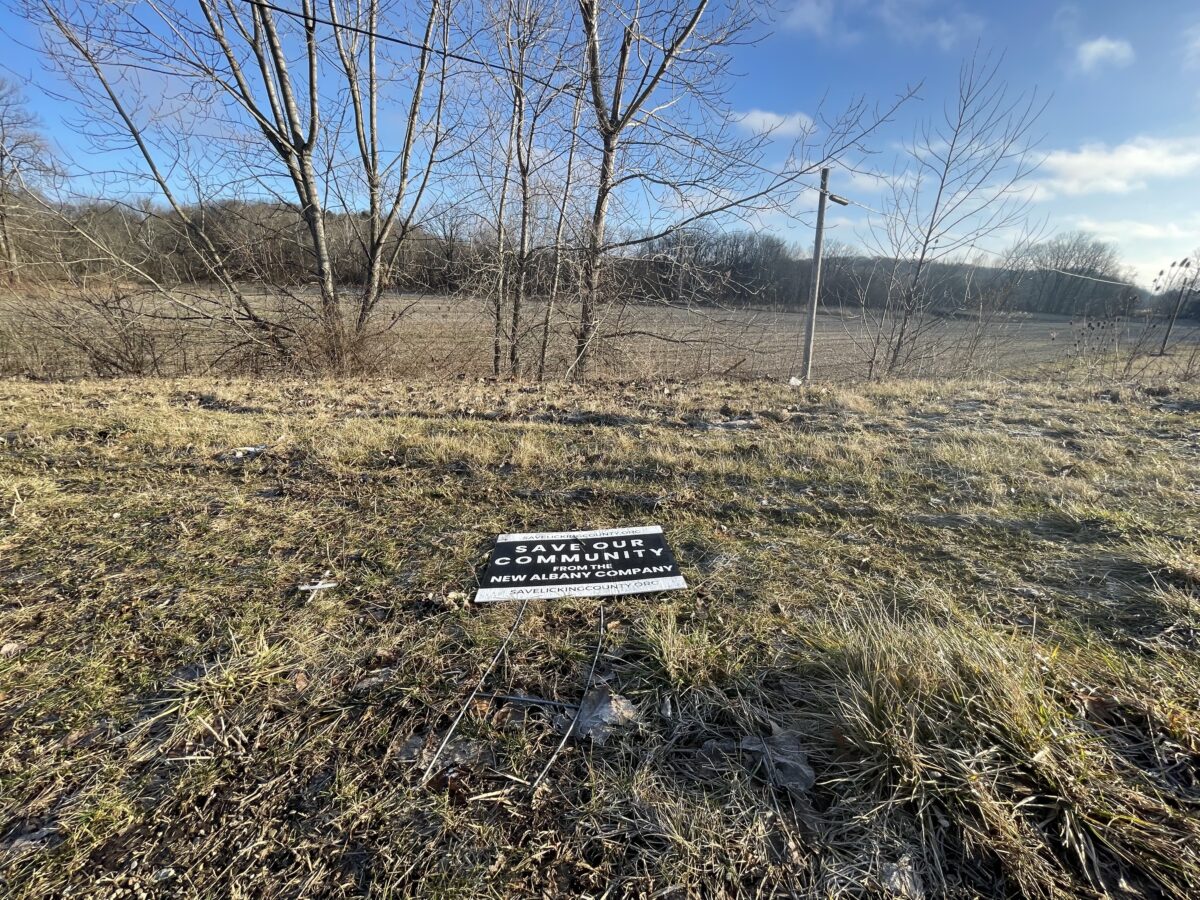In its quest for water to serve the future needs of the computer-chip manufacturing complex Intel is building in western Licking County, the City of New Albany is seeking a permit from Licking County authorities to drill a test water well just west of Granville.
New Albany also plans to ask for a permit to drill a test well in the same aquifer a few miles to the north near Alexandria on land owned by Colleen Geiger, the same site where Shelly Materials wants to build and operate concrete- and asphalt-mixing plants.
Officials in Granville village and township remain alarmed by the potential daily extraction of millions of gallons of water from – and potential contamination of – the aquifer, the same underground water supply that provides drinking water to Granville and Alexandria, which buys potable water from Granville.
New Albany sent a letter last week to Licking County Planning Manager Brad Mercer asking for a permit to drill a well on a portion of the 106 acres of farmland that Granville Township Trustee Dan VanNess sold to the New Albany Company late last year. The letter says engineers working for the City of New Albany want to conduct a test over 72 hours, drawing a total of 11 million gallons or more of water out of the ground and into Raccoon Creek.

Granville Village Manager Herb Koehler said the village will ask the Licking County Planning and Development office to deny the permit New Albany seeks to drill a test well in the floodplain along Raccoon Creek, which flows through land above the aquifer and helps recharge Granville’s well field.
“We would take any administrative means at our disposal to address the permit process,” Koehler said. “If there’s an avenue to do something to contest it, we intend to do that.”
If the village can’t stop the drilling, Koehler said, village officials expect that New Albany officials will hold to their promise to keep the village, township and county officials informed every step of the way and provide results of New Albany’s test.
New Albany Director of Community Development Jennifer Chrysler said the city will keep Granville officials informed about the permit and, if approved, details of its plans to drill the test well and the results of the test.
Chrysler said June is the earliest New Albany could conduct the test, and it would only do the testing when the conditions are right. That means, for example, that New Albany would take into consideration a concern Koehler raised about any testing during a dry spell or drought conditions.
“The timing is very important,” Koehler said. “If you stress the aquifer purposely during a dry period, it could run wells dry.”
Koehler also is concerned about the impact of two tests from the same aquifer.
New Albany has not yet officially asked Licking County for a permit for a test well in the floodplain on the Geiger property, but Chrysler said it intends to do that in the near future. She also said the planned test on that site would be during a 24-hour period rather than a 72-hour period, and that the two tests would not be done at the same time.
Kristy Hawthorne, program administrator for the Licking County Soil and Water Conservation District, said it will be a challenge for New Albany to secure a permit to work on the Geiger site, because of a pending citation. The site owner and Shelly Materials have been cited for violating floodplain regulations, and Hawthorne said no work can be done on the land where the violation occurred until that violation has been resolved.
Koehler and Granville Village Mayor Melissa Hartfield have raised concerns about possible contamination of Granville’s drinking water if pumps are installed west of Granville.
A plume of toxic chemicals from a defunct solvents company has been stationary in the aquifer under Granville for decades. A plume occurs when contaminants are concentrated in a particular place underground. An engineering firm monitoring the plume on behalf of the federal Environmental Protection Agency has told village officials that any future wells west of the village drawing millions of gallons of water a day could pull that toxic plume into the village’s well field and pollute drinking water supplies.
Chrysler said New Albany officials have been talking with local officials and taking their concerns into consideration. They are working to communicate and work with village, township and county authorities, and that New Albany is not in a big rush to conduct water well tests.
“There’s no pressure,” she said. “Intel is committed to phase one” of its construction plans, and the City of Columbus has promised to supply the 1.5 million gallons a day Intel says it needs for its manufacturing process.
“We’re just gathering data for the future,” Chrysler said, adding that they expect a project of this magnitude will take three to five years to complete.
Granville Township Trustee Bryn Bird said the township will work with the village to encourage the county to reject the permit and the water-well testing, because the township is concerned about what might come next. If New Albany finds what it believes is a suitable water supply in Granville Township, Bird expects the city will want to drill a commercial well and build a pumping station and the infrastructure needed to get water to the New Albany Business Park in western Licking County.
That land is currently zoned as a conservation district, which means the regulations about the type of activities that could happen on that land are even more restrictive than land zoned for agriculture.
“If they tried to drill a commercial well, it could be outside the zoning,” Bird said.
Alan Miller writes for TheReportingProject.org, the nonprofit news organization of Denison University’s Journalism program, which is funded by the Mellon Foundation and donations from readers.

